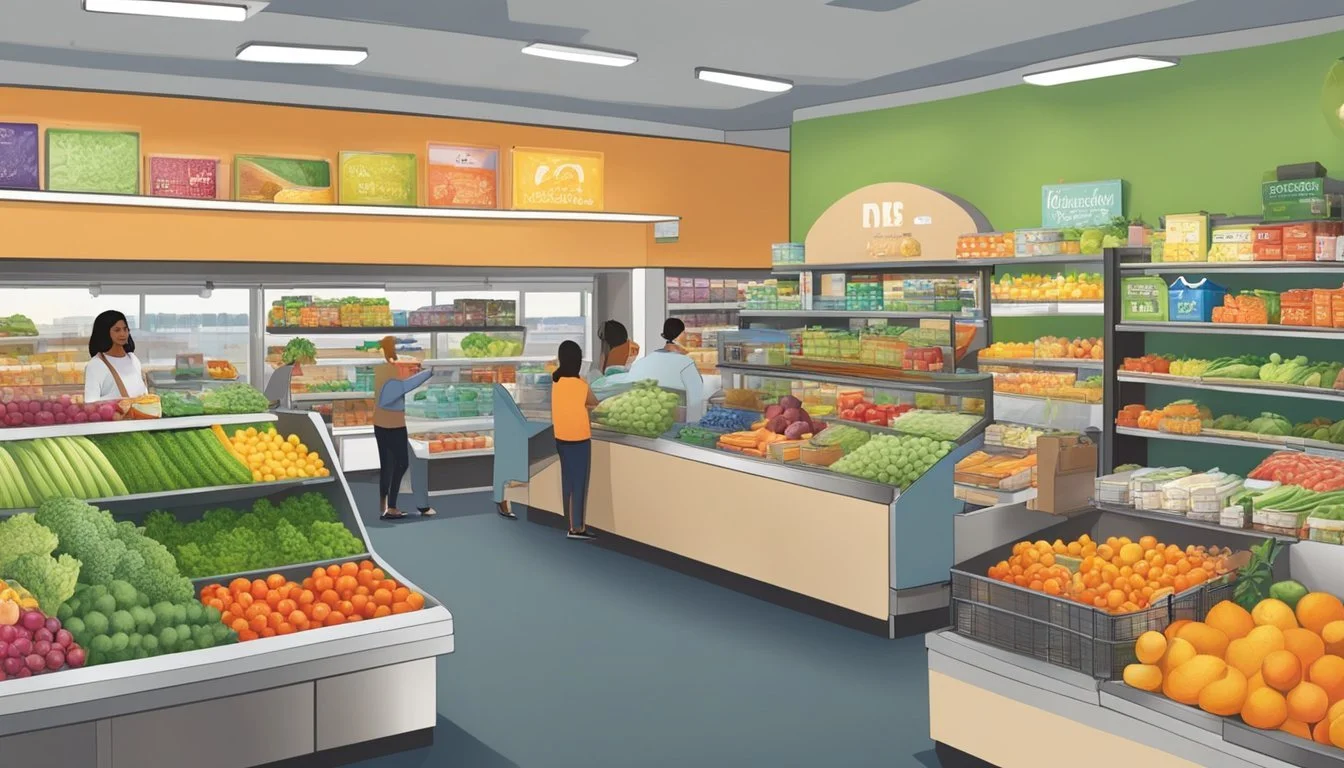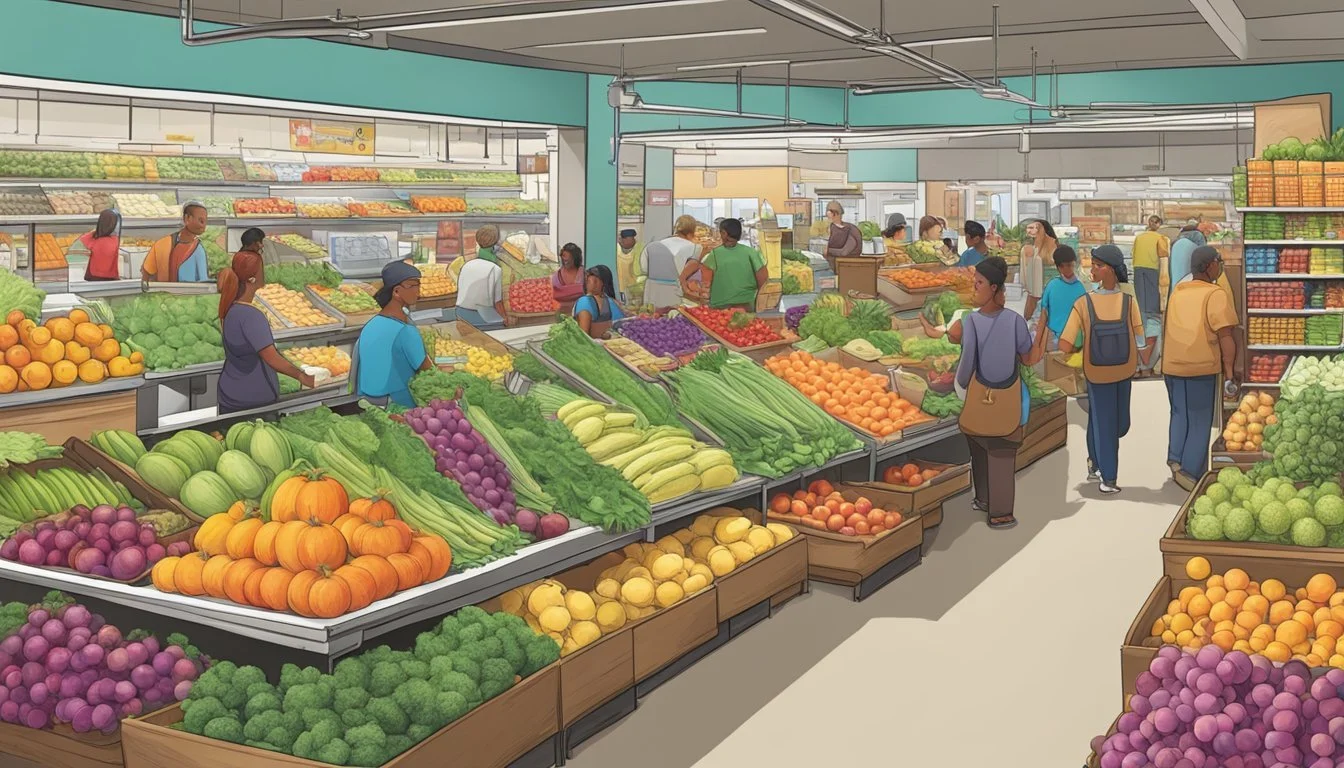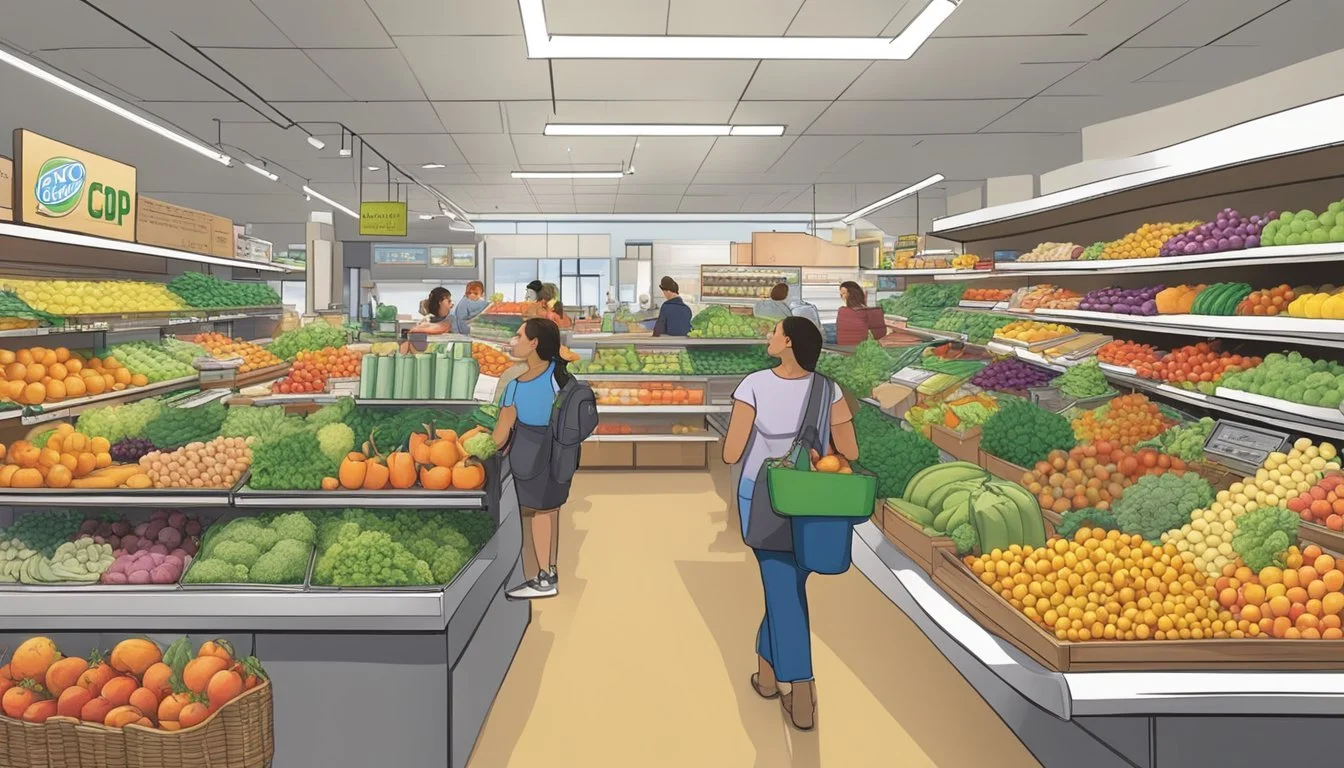Guide to Food Co-Ops in San Antonio, TX
Your Access to Local, Fresh Produce
San Antonio, Texas, is a city renowned for its vibrant culture and culinary diversity. Within this bustling urban landscape, food co-ops have emerged as a cornerstone for the community-minded, offering a more personalized food shopping experience focused on high-quality, locally-sourced products. These cooperatives are driven by the principles of shared ownership and a commitment to sustainable agriculture, making them a popular alternative to conventional grocery stores.
The food co-op scene in San Antonio provides residents with access to fresh, farm-to-table options while supporting local farmers and artisans. Initiatives like The Farm Connection emphasize the ease of consolidating products from various local producers into a single pick-up location, thereby reducing travel time for consumers and extending the reach of local produce. Such co-ops also bring with them the added value of community engagement, allowing members to have a say in the operations and product selections while building a food-centric network.
What Is a Food Co-Op?
A food cooperative, commonly known as a food co-op, is a grocery store format that operates on the principles of collective ownership by its members. Food co-ops focus on providing a variety of products with an emphasis on local, organic, and community-oriented offerings.
Members of a co-op typically have a say in the business decisions and share in the profits. However, non-members can usually shop at these stores as well. Co-ops are distinct from corporate grocery chains because they prioritize local welfare over profits. They often forge a direct relationship with farmers and producers to ensure a supply of fresh, organic produce.
Community Supported Agriculture (CSA) can be closely linked with food co-ops, as both emphasize local, fresh, and seasonal produce delivered directly from farms to consumers. This connection supports regional agricultural efforts and facilitates access to healthful food choices.
Food co-ops also tend to offer:
A selection of organic and natural foods
Locally sourced produce
Transparent sourcing that supports local farmers and producers
Below is an overview of the core aspects of food co-ops:
Feature Description Ownership Owned and democratically governed by community members Products Offer local, organic, and sustainable goods Economic Model Profits reinvested into the co-op or returned to members Community Impact Support local agriculture and contribute to the local economy
Food co-ops strive to build a network that enriches the community not just economically, but also socially and environmentally. They are an integral part of the movement towards sustainable, healthful, and equitable food systems.
Benefits of Joining a Food Co-Op
Joining a food cooperative in San Antonio provides members with tangible rewards ranging from financial savings to health enhancements. It also fosters a closer relationship with the local community.
Economic Advantages
Local Economy: A member's spending at a co-op stays within the San Antonio economy, bolstering local employment and small businesses. Co-op members often receive shopping discounts and possibly patronage refunds, which are portions of the co-op's surplus returned to its members based on their purchases.
Ethical Purchasing: Shoppers can support ethical business practices, as co-ops prioritize sourcing from local food producers and sustainable ventures. This often results in members having a direct impact on amplifying the market for local goods.
Health and Nutrition
Access to Nutritious Foods: Co-ops are known for increasing the availability of affordable, fresh produce, and other healthful food options. By providing access to high-quality local food, members enjoy the benefits of a diet rich in fresh vegetables and fruits, which can improve overall health.
Healthy Eating Awareness: The cooperative model promotes nutritional education and awareness. This initiative often leads to a community informed about the advantages of healthy eating and committed to maintaining a nutritious diet.
Community Engagement
Volunteer Opportunities: Members who volunteer at food co-ops experience heightened self-esteem, confidence, and a sense of purpose. This engagement contributes positively to their individual well-being.
Social Inclusivity: Co-ops in San Antonio welcome everyone, promoting a diverse and inclusive atmosphere. These spaces become hubs for community interaction, where members can celebrate their differences and unite over the common goal of supporting local, ethical, and health-conscious food choices.
How to Find and Join a Food Co-Op
When seeking involvement in a local food co-op in San Antonio, TX, interested individuals must consider the membership basics and how co-ops foster direct relationships with farmers.
Membership Information
Those interested in joining a food co-op should note that membership typically involves purchasing a share or paying an annual fee, which contributes to the operational costs and product sourcing from local producers. Members often benefit from discounts and have a say in co-op affairs. The initial step is to identify local food co-ops in San Antonio, TX, then visit in person or review the co-op's website for membership details. Information on fees, benefits, and membership responsibilities are typically available through these channels.
Find a Food Co-Op: San Antonio residents can locate a nearby co-op by conducting an online search or visiting local community boards.
Membership Process: Request information on joining from the co-op directly, which includes filling out an application and agreeing to membership terms.
Costs and Contributions: Expect to pay a fee or investment share that varies by co-op. This investment supports the co-op and may provide dividends based on patronage.
The Farm Connection
Food co-ops in San Antonio prioritize connections with local farmers and producers, thereby supporting the region's agriculture and offering fresh, locally-sourced products to members. The co-op acts as a buying club where bulk orders are made to supply members with a variety of goods at fair prices. These partnerships underscore the co-op's commitment to sustainability and community support.
Support for Local Farmers: Co-ops usually buy directly from local farmers, which assures members of the origin and quality of the produce.
Seasonal Availability: Expect seasonal variations in product offerings due to the co-op's reliance on local farm production cycles.
By joining a food co-op, members become part of a community-oriented marketplace that benefits local agriculture and fosters healthier, more sustainable buying habits.
Types of Food Co-Ops in San Antonio
In San Antonio, food co-ops cater to Central Texans seeking organic produce and a selection of high-quality products through various operational models.
Storefront Co-Ops
Storefront co-ops operate as brick-and-mortar locations where members and non-members can purchase goods. They focus on offering a wide selection of products, frequently supporting local producers and sustainable practices. The Farm Connection is an example of a storefront co-op in San Antonio, providing customers with convenient access to organic produce in a centralized retail space.
Online Co-Ops
Online co-ops serve those who prefer the convenience of shopping from their homes. They typically offer a curated range of high-quality, locally-sourced products. Customers can place orders online with the benefit of having everything in one place, rather than visiting individual farms or markets. Online co-ops are a flexible alternative for busy consumers looking to support local agriculture and obtain organic goods.
Buying Clubs
Buying clubs are a communal effort, where members collaborate to make bulk purchases directly from producers or wholesalers. This model allows members to access a diverse selection of fresh, organic produce at a reduced rate. By buying in larger quantities, members benefit from lower prices, a system that supports both the community and local farmers. The reduction in packaging and transportation further contributes to the sustainability of this co-op type.
Understanding Co-Op Operations
Food co-ops in San Antonio operate as community-oriented hubs where local food and produce are aggregated from various suppliers, often including elements of community-supported agriculture. They focus on providing consumers with direct access to farm-fresh goods, such as those sourced by The Farm Connection. These operations are complex and involve numerous aspects including governance, volunteering, and supplier relations.
Governance
Food co-ops typically abide by a democratic governance structure, where operational decisions are made by member-owners who have an equal say in the co-op's affairs. In San Antonio, a co-op may establish various committees to oversee specific functions, ensuring community needs are met effectively and sustainably. The Farm Connection, for instance, could operate under these principles, striving for an inclusive environment where each member's voice is heard and valued within the community it serves.
Volunteering
Volunteering is a vital element of food co-ops, serving as a foundation for their operational model. Volunteers often receive benefits such as discounts on products or participation in special events. This can provide a hands-on way for community members to engage with local food efforts and support the co-op's daily functions, from stocking shelves to helping at the checkout.
Supplier Relations
The nexus between a food co-op and its suppliers is central to its success. Co-ops like The Farm Connection work closely with local farms and businesses to ensure a steady supply of fresh, locally-sourced products. The relationships are built on mutual support, where co-ops offer a reliable market for local produce, and suppliers, in turn, provide quality goods that align with the co-op’s emphasis on sustainability and community health.
Where to Locate Co-Ops in San Antonio
Residents and visitors in San Antonio seeking fresh, locally-sourced produce have the convenience of several food co-ops within the city. These co-ops provide a centralized location for products from local farms, supporting the community and reducing the need to visit multiple farms.
Interactive Map
An interactive map is a tool for those in San Antonio to visually locate the nearest food co-ops. It offers a spatial understanding of each co-op's location in relation to the viewer's current position. Users can usually access these maps on local food directories or specific co-op websites. Some maps include filters to narrow down options based on distance or product availability.
Local Directory
A local directory offers a comprehensive list of food co-ops in the San Antonio area. The directory typically includes names, addresses, and contact information, allowing individuals to reach out directly or plan a visit. The Farm Connection, for example, is a notable mention where one can pick up a variety of products from different local farms in one convenient spot. Directories may be available online or in printed community resource guides.
From Farm to Table
San Antonio's food co-ops prioritize high-quality, locally-sourced ingredients, facilitating direct access to farm fresh products for residents.
Farm Fresh Produce
Residents of San Antonio can enjoy a variety of vegetables and fruits that are sourced directly from local farms. These produce items are known for their freshness and quality, often arriving at the co-op within a day of harvest.
Seasonal Vegetables: A rotating selection based on what's in season.
Fruits: Local offerings that may include citrus, berries, and more.
Meat and Dairy
Patrons can find a selection of meat and dairy products that are supplied by regional farms. This includes grass-fed beef and free-range poultry, which are popular for their enhanced flavor and nutritional value.
Meat: Grass-fed beef, free-range chicken, and more.
Dairy: Milk, cheese, and other dairy items from local dairies.
Essential Pantry Items
Local grocery stores often stock essential pantry items that are produced nearby. These staples might include grains, oils, and other basics, ensuring that residents have access to a wholly local shopping experience.
Grains: Locally-grown and milled options.
Oils: Small-batch oils from regional producers.
Co-Op Events and Education
Food co-ops in San Antonio, TX, play a pivotal role in connecting consumers with local agriculture through events and educational programs focused on sustainable farming practices and supporting new entrants into the agricultural sector.
Workshops for Beginning Farmers
San Antonio food co-ops regularly host workshops aimed at beginning farmers focusing on the essentials of starting and maintaining a successful farming business. Topics often include regenerative agriculture practices, how to effectively market produce at farmers markets, and the basics of crop rotation and soil health.
Seasonal Events
Throughout the year, co-ops in the region organize seasonal events to celebrate local food and community. These events provide opportunities for beginning farmers to showcase their products and for consumers to learn more about where their food comes from. From spring planting festivals to autumn harvest celebrations, these gatherings underscore the connection between local farms and the wider community.
Supporting Local Agriculture
In San Antonio, Texas, supporting local agriculture not only contributes to the community's sustainability but also ensures access to fresh, locally grown produce. This includes a variety of foods such as meats and essential oils. Consumers and farmers alike are turning towards models like Community-Supported Agriculture (CSA) and regenerative farming practices to bolster local food systems.
Community-Supported Agriculture (CSA)
Community-Supported Agriculture (CSA) is a model where consumers buy shares of a farm's harvest in advance. In San Antonio, The Farm Connection operates on the CSA model, offering pickups of fresh produce from a single location. This system provides farmers with upfront capital and guarantees a market for their products, while consumers receive a regular supply of fresh, locally grown foods. CSAs often include a range of products, from vegetables and fruits to meats and essential oils.
Regenerative Farming Practices
Farmers in San Antonio are integrating regenerative farming practices to enrich the soil, increase biodiversity, and improve the ecosystem. Regenerative agriculture involves techniques such as crop rotation, no-till farming, and the use of cover crops. These methods not only maintain soil health but also enhance the quality of the produce. By adopting regenerative practices, San Antonio's local farms contribute to a sustainable food system that supports both the environment and community health.
Co-Op Shopping Tips
When shopping at a food co-op in San Antonio, customers should focus on the uniqueness of product selections and the pricing structure. These two aspects can significantly enhance the shopping experience when one understands how to navigate them.
Navigating Product Selection
Food co-ops typically offer a diverse range of fresh, natural, and organic produce. Customers should look for seasonal items to get the best that local agriculture has to offer. Most co-ops label their produce clearly, providing information on the source and cultivation practices. It's beneficial for shoppers to take advantage of this curated selection by:
Prioritizing seasonal produce for peak freshness and flavor.
Seeking out local and organic options to support sustainable farming practices.
Understanding Pricing
The pricing in food co-ops can differ from conventional grocery stores, often reflecting the true cost of sustainable farming. Co-ops may offer discounts for members or benefits such as dividends at the end of the fiscal year. Customers can make the most of co-op pricing by:
Becoming a member to receive discounts and other benefits.
Comparing the unit price of items to understand the best value.
Frequently Asked Questions
What is a food co-op?
A food co-op, or cooperative, is a member-owned business that offers a variety of grocery items and products, often focusing on local, ethical, and organic options. They may also support community-supported agriculture (CSA) programs.
Where can I find a food co-op in San Antonio, TX?
The Farm Connection is known for providing high-quality products that customers can pick up from one convenient location.
How does pick-up at The Farm Connection work?
Customers usually order in advance and have a designated pick-up location where they can collect their goods. This eliminates the need to visit multiple farms or spend time at the farmer's market.
Does San Antonio have a farmer's market?
Yes, there are several farmer's markets in San Antonio where local produce and goods can be purchased. The Farm Connection offers a similar experience with the convenience of a single pick-up point.
What is community-supported agriculture (CSA)?
CSA is a program where consumers can purchase shares from local farms and in return, receive regular boxes of seasonal produce. This supports local farmers and provides fresh, local food to the community.
Are there food incubators in San Antonio?
The CO-OP SA functions as an incubator for small, food-related businesses, helping to foster growth and innovation in the local food industry.









